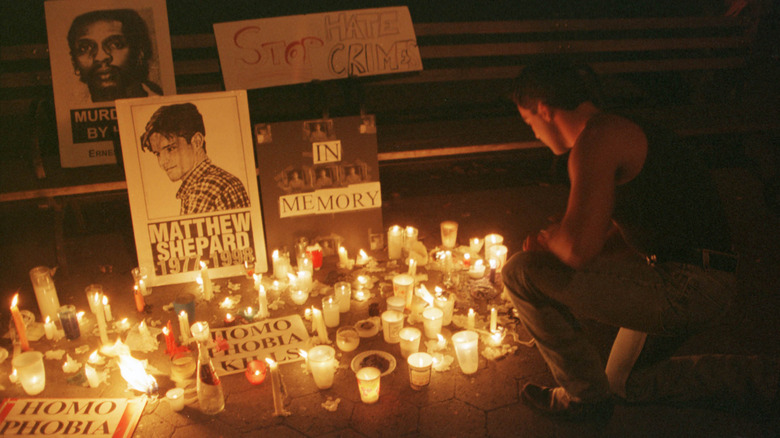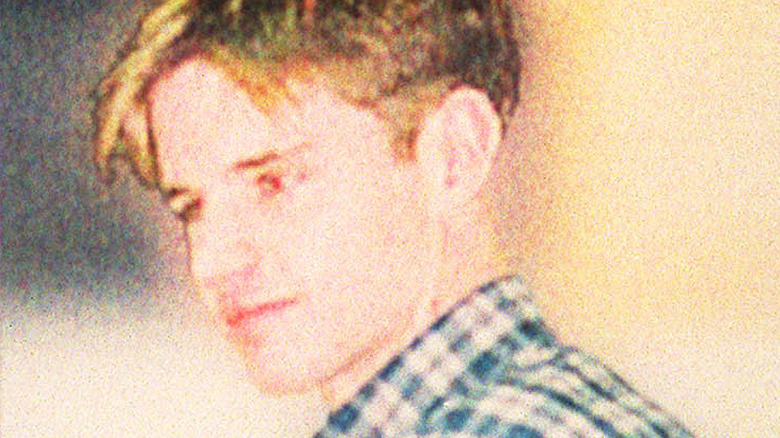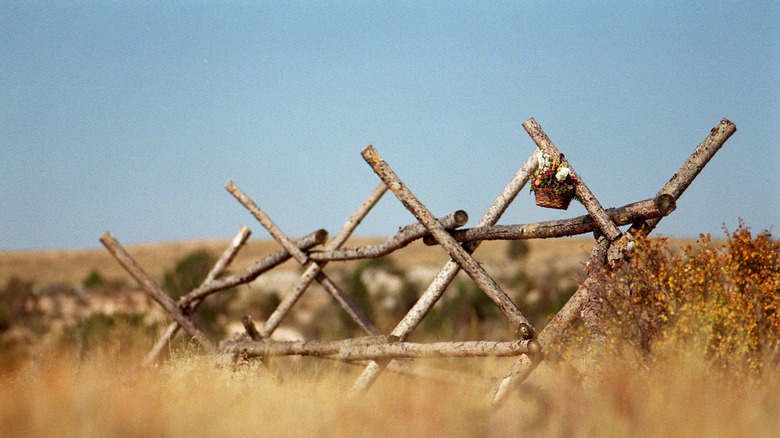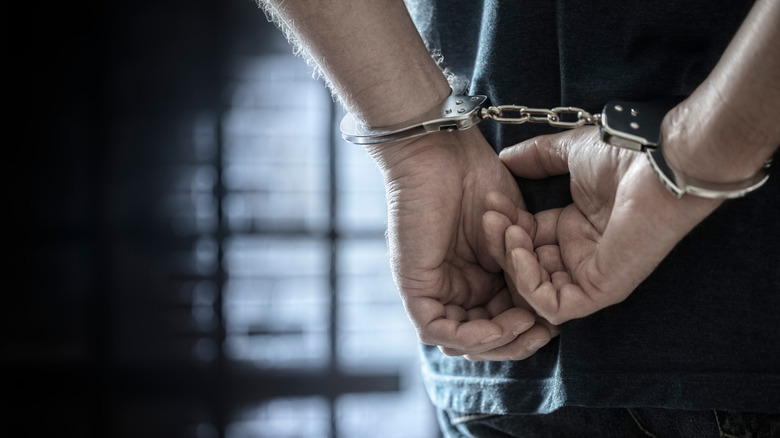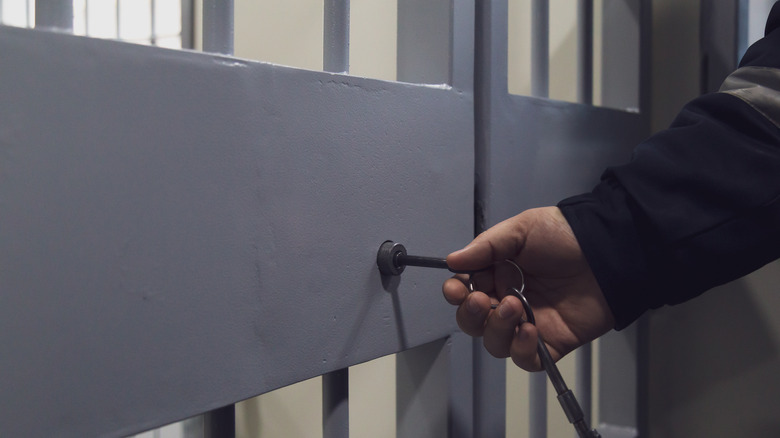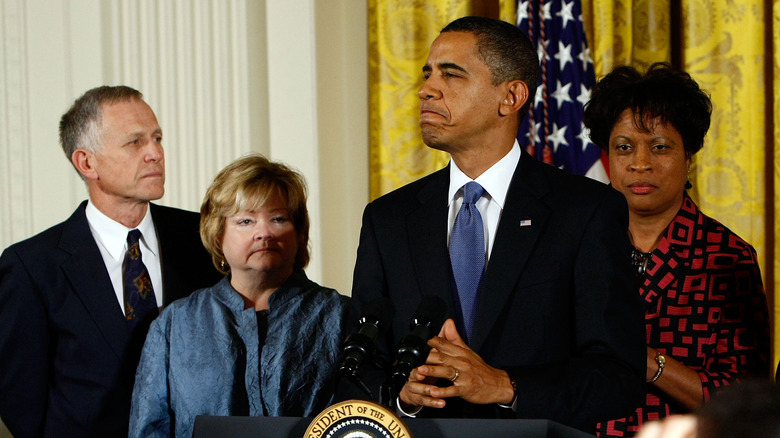What Happened To The People Who Murdered Matthew Shepard?
The murder of college student Matthew Shepard shocked the nation on multiple levels. The sheer brutality of the murder — which consisted of two roofing workers beating and then tying Shepard to a fence, where he was left to die — was appalling, but it also symbolized something even bigger. Shepard was gay, and his 1998 murder cast a light on the challenges faced by members of the LGBTQ community and the fact that the United States still had a lot of ground to make up when it came to acceptance and equality (via the Los Angeles Times).
While Shepard became a symbol of the movement toward equality and laws, the state of Wyoming, where the murder took place, remains one of a handful to have not passed laws pertaining to crimes in which a victim's identity, including their sexual identity, served as a motivating factor. According to a 2018 Associated Press story posted by The Mercury News, Sara Burlingame of the advocacy group Wyoming Equality says that the state continues to fight insinuations that Shepard was murdered because he was gay. Also denying this allegation is one of Shepard's murderers, Russell Henderson. Henderson and the other convicted murderer, Aaron McKinney, are currently serving life sentences for their crimes.
Who was Matthew Shepard?
Matthew Shepard was born in Casper, Wyoming in 1976. According to Biography, Shepard was remembered as being kind, sensitive, and quiet when he was a kid. Casper is known for its oil industry, which Shepard's father Dennis was part of. Dennis Shepard's career led the entire family to Dharan, Saudi Arabia for a job. Matthew Shepard was a junior in high school at the time and he wrapped up his high school years in Switzerland at The American School, where he studied several foreign languages as well as theater. According to the Matthew Shepard Foundation, Shepard was chosen to be a peer counselor at the school and was known to fight for the acceptance of everyone.
Shepard returned to the United States for college and eventually returned to Casper, where he attended the local community college. There, Shepard met Romaine Patterson through a teacher. Patterson was a lesbian, known for being very outgoing, and hit it off with Shepard, who had known about his own sexuality for years and came out to his mother while still in high school. Shepard and Patterson moved to Denver, Colorado together but returned to Wyoming, at which point he started taking classes in political science and international relations at the University of Wyoming in Laramie.
The murder of Matthew Shepard
According to Oxygen, on October 6, 1998, Shepard was out at a gay bar in Laramie, Wyoming known as The Fireside Lounge. Earlier that evening, Shepard had been at a meeting with friends to plan on-campus events for an LGBTQ awareness week, per BBC News. Shepard had asked his friends if they wanted to go with him to The Fireside Lounge for a beer but didn't get any takers.
At the bar, he encountered two men, Russell Henderson and Aaron McKinney. Both men were the same age as Shepard and saw the slightly built Shepard — who was just a couple inches over five feet tall and didn't weigh much more than 100 pounds — as a target they could easily overpower. The pair lured Shepard outside the bar and abducted him. By this point, it was the early morning hours of October 7, and McKinney and Henderson drove Shepard to a rural area where they robbed him and beat him with the butt of a pistol, before tying him to a fence and leaving him behind. According to Biography, McKinney would later state that he thought Shepard was dead when they left him, but that wasn't the case; Shepard was still alive, albeit in a coma.
Shepard was discovered by a mountain biker — who at first glance thought that Shepard's mutilated body tied to the fence post was a scarecrow — on the evening of October 7. The 21-year-old was taken to a hospital in Fort Collins, Colorado where he died on October 12, 1998 (via Matthew Shepard Foundation).
The arrests of Russell Henderson and Aaron McKinney
After leaving Shepard tied to a fence post in rural Wyoming, Henderson and McKinney returned to Laramie, where they got in a street fight with two other men, according to The Coloradoan. When police responded to the fight, Russell and Henderson fled, but police found Shepard's credit card and shoes in McKinney's truck along with the bloody .357 Smith & Wesson pistol used to bludgeon Shepard (via Biography). Russell and Henderson. were arrested and charged with attempted first-degree murder, while their respective girlfriends, Kristen Price and Chasity Pasley, were also arrested and charged as accessories.
After Shepard's death, the attempted murder charges became full-on murder trials. Henderson and McKinney argued that the murder was the result of a robbery gone bad and that Shepard's sexual orientation wasn't a factor, though McKinney's own account of the night hurts that assertion. According to the BBC, McKinney himself said that he became angry when Shepard placed his hand on his leg, even saying that he told Shepard, "Guess what? We're not gay, and we're going to jack you up." A contradictory statement from McKinney indicates that Shepard didn't touch him, but looked like he was going to. In a letter written from jail, McKinney admitted to being homophobic.
Henderson and McKinney were both found guilty
Going into the murder trial, McKinney's lawyers used a defense strategy that involved pointing to McKinney's claim that Shepard touched him (via BBC News). According to the Williams Institute at UCLA's School of Law, this is considered an example of a "gay panic" defense, often used in cases where an LGBTQ person is the murder victim. Twelve states plus the District of Columbia are the only places where this defense has been banned. However, the judge in McKinney's murder trial would not permit it.
Both Henderson and McKinney were found guilty of murdering Shepard and were both sentenced to life in prison. Meanwhile, Chasity Pasley was found guilty of helping the two discard bloody clothing belonging to Shepard. According to the Associated Press, she was sentenced to 15 months to 2 years in prison.
Since then, Henderson has claimed that he followed McKinney's lead and that their crime was not motivated by Shepard's sexual orientation, per the Associated Press. Both have served time in different states due to overcrowding in Wyoming prisons, with McKinney being held in Mississippi and Henderson currently being held at a prison in Torrington, Wyoming, a small town near the Wyoming-Nebraska border.
The aftermath of the Matthew Shepard murder
Matthew Shepard's death was a catalyst for a push toward adopting laws that protect members of the LGBTQ community. Shepard's parents started the Matthew Shepard Foundation to honor their son and to help parents understand and accept their children who may be questioning their sexuality. The foundation also pushed for the passage of the United States' first piece of federal hate crime legislation — the Matthew Shepard and James Byrd, Jr. Hate Crimes Prevention Act — which was signed into law in 2009.
According to Oxygen, Aaron McKinney has never displayed even an ounce of remorse for his crimes, even doubling down. In a 2009 interview quoted by The Denver Post, McKinney stated bluntly, "Matt Shepard needed killing," adding, "As far as Matt is concerned, I don't have any remorse. The night I did it, I did have hatred for homosexuals."
However, his codefendant, Russell Henderson, has a different perspective on the heinous murder the two committed. "As tragic as it is, and as unfortunate as it is, and as hard as it is for Matthew's family, and for my family, for all of us, to go through, it opened up all of us to be better people and really think about who we are," Henderson told the Associated Press in 2018, 20 years after Shepard's murder. "I think about Matthew every single day of my life. I think about him and every single one of those days that I've had that he hasn't had, his family hasn't had, his friends haven't had. I'm so, so ashamed I was ever part of this."
